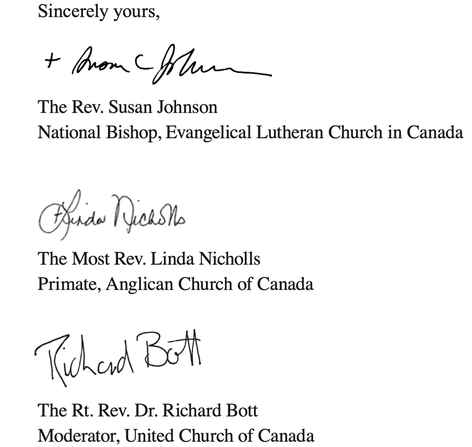This is a joint statement from the Moderator of the United Church of Canada, the National Bishop of the Evangelical Lutheran Church in Canada and the Primate of the Anglican Church of Canada.
The events taking place across North America in response to the murder of George Floyd have given all of us a stark reminder of the ongoing sin of racism in our communities. Centuries of anger at injustice and anti-Black racism are literally bursting into flames as people stand for political and cultural change to address these deep-seated systems that work to oppress so many members of our communities. Coupled with the death of Ahmaud Arbery, the threat against Christian Cooper who was participating in a park activity so many of us take for granted, and so many other day to day activities, we are reminded of the horrendous consequences of anti-Black racism again and again, depriving people of their safety, their freedom and their lives.
We as church leaders, acknowledge the pain, frustrations and anger of our Black communities, and recognize that systemic anti-Black racism is prevalent in our context in Canada as well; in the streets of our communities, in the justice and policing systems, and in our congregations and parishes. It is important for church members in our largely white churches to look at how we continue to perpetuate anti-Black racism, either inadvertently or intentionally.
George Floyd’s words, “I can’t breathe,” continue to ring in our ears; they act as a prophetic voice of the pain and re-traumatization that is coming from peoples of African descent again and again. The voice is weary and tired. “We can’t breathe” is the collective chant of peoples of African descent, especially those in North America, as they continue to struggle against centuries of racism and systemic discrimination.
We are hearing the same voice from ministers of African descent, particularly as they pastor predominantly white congregations. This voice is tired of violence towards Black lives. This voice is tired of the exclusion of people of African descent in our structures of leadership. This voice is tired of the emptiness that comes from supposed allies who aren’t willing to acknowledge their own privilege and responsibility.
As Primate of the Anglican Church of Canada, The National Bishop of the Evangelical Lutheran Church in Canada, and Moderator of The United Church of Canada we want to affirm our commitment to ending our silence about and working towards the dismantling of anti-Black racism.
In March, we jointly released a letter in support of the International Decade for Peoples of African Descent, acknowledging the reality of racism in our institutions and committing ourselves to naming and working towards the eradication of anti-Black racism. We are inviting the members of our communities to join us in this commitment by visibly and concretely demonstrating the call for solidarity in the UN decade. Some suggestions are:
We as church leaders, acknowledge the pain, frustrations and anger of our Black communities, and recognize that systemic anti-Black racism is prevalent in our context in Canada as well; in the streets of our communities, in the justice and policing systems, and in our congregations and parishes. It is important for church members in our largely white churches to look at how we continue to perpetuate anti-Black racism, either inadvertently or intentionally.
George Floyd’s words, “I can’t breathe,” continue to ring in our ears; they act as a prophetic voice of the pain and re-traumatization that is coming from peoples of African descent again and again. The voice is weary and tired. “We can’t breathe” is the collective chant of peoples of African descent, especially those in North America, as they continue to struggle against centuries of racism and systemic discrimination.
We are hearing the same voice from ministers of African descent, particularly as they pastor predominantly white congregations. This voice is tired of violence towards Black lives. This voice is tired of the exclusion of people of African descent in our structures of leadership. This voice is tired of the emptiness that comes from supposed allies who aren’t willing to acknowledge their own privilege and responsibility.
As Primate of the Anglican Church of Canada, The National Bishop of the Evangelical Lutheran Church in Canada, and Moderator of The United Church of Canada we want to affirm our commitment to ending our silence about and working towards the dismantling of anti-Black racism.
In March, we jointly released a letter in support of the International Decade for Peoples of African Descent, acknowledging the reality of racism in our institutions and committing ourselves to naming and working towards the eradication of anti-Black racism. We are inviting the members of our communities to join us in this commitment by visibly and concretely demonstrating the call for solidarity in the UN decade. Some suggestions are:
- Reach out to a friend of African descent and listen to their story and how these events have affected them. This is also a good practice for primarily white congregations whose minister is African descent.
- Conscientiously and prayerfully consider joining public expressions of solidarity towards seeking justice against anti-Black racism;
- Read books and other materials on Black history in the Canadian context, the impact of anti-Black racism, and the reality of white privilege;
- Research critical elements of Black legacy;
- Engage with the artistic and cultural production of people of African descent, with a commitment to learn the history and context within these expressions.
We call upon our members to join with us in this commitment.



 RSS Feed
RSS Feed